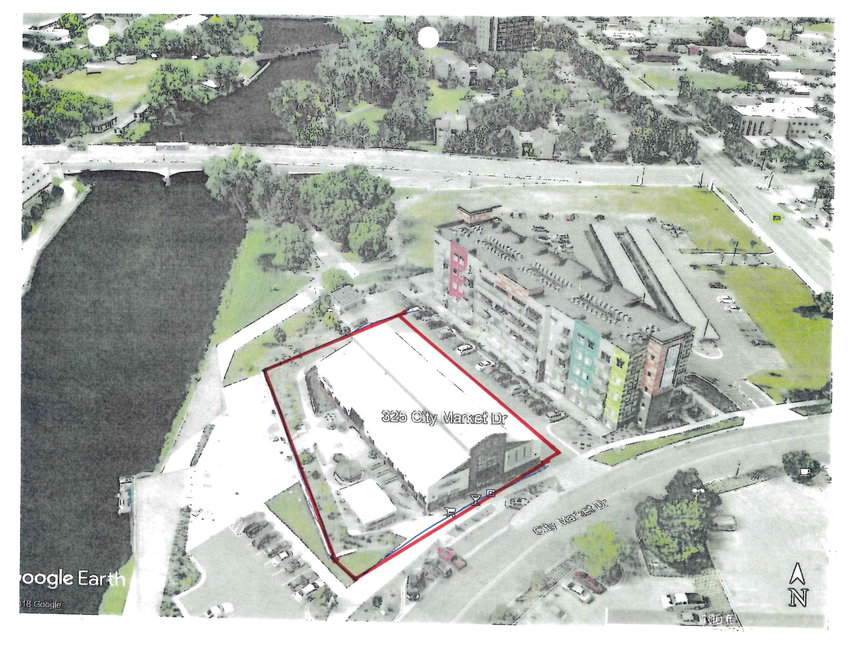
Lansing Mayor Andy Schor on Friday walked back a ballot proposal that would have enabled the sale of the City Market building. He's looking for proposals to reactivate the space that wouldn't require regular subsidies from city coffers.
FRIDAY, JULY 27 — Mayor Andy Schor isn’t giving up on Lansing’s City Market building.
Hundreds of local residents on Thursday gathered at the struggling riverside marketplace to voice their ideas about the property’s uncertain future. Budget cuts all but confirmed its imminent closure as suggestions surrounding a private sale reached a head. But Schor — after fielding their ideas — backed off the proposed sale.
“If we are going to have a restaurant or bar, attract retail, try again for a grocery market, create an entertainment venue, or use it for any number of the other ideas that have been presented to me, then the city must remain in control of the space,” Schor said in a statement on Friday morning. “Sale of the market building is not optimal.”
Schor earlier this month sought to sell the parkland after City Council slashed the market’s subsidy and removed its permanent site designation along the Grand River. The market could stay open through the end of the summer, Schor suggested, but the space would need to be transformed if it were to survive into next year.
Fewer and fewer visitors over the years forced most vendors to abandon their stake in the market, essentially creating an empty warehouse with a bar and restaurant at one end. Federal officials later pulled its authorization to accept Bridge card food benefits because it was no longer considered a farmer’s market.
Lansing’s charter requires a ballot initiative to offload parkland property within city limits. Schor repeatedly maintained there was no “secret plan” for development at the embattled property but he wanted to keep all options on the table. His decision on Friday morning ensured taxpayers will retain control as proposals develop.
“The Lansing City Market property is an important space on our riverfront,” Schor added. “With the removal of the taxpayer subsidy and its upcoming closure, we need to do everything we can to ensure this space is not vacant for long, and is activated for the future. … There is clearly a passion for Lansing and our riverfront.”
Dozens of community advocates launched a bevy of suggestions at Schor on Thursday evening. Some wanted to see it become a sort of “welcome center” to better promote the city. Others simply wanted it restored to its former glory as a farmer’s market with some revamped managerial tactics to ensure its future success.
A few offered some more outlandish ideas, like a marketplace for marijuana as recreational legalization inches closer to the ballot or an advocacy center for the local homeless community. Most, however, didn’t want to see their parkland sold off to a developer and sought to redefine the market as a place-maker in the local community.
Lansing resident Loretta Stanaway suggested a reformed farmer’s market, staffed by city employees and filled with local vendors who pay “slotting fees” rather than expensive rent payments. Expanded and more consistent hours would bolster traffic and improved parking would ensure easier access, she contended.
“Many Michigan cities and towns have viable city markets,” Stanaway wrote in her proposed concept that was later published in the Lansing State Journal. “It is not rocket science to successfully operate such a venture. I came up with my proposal in less than one hour. It merely takes intent to succeed instead of intent to fail.”
Entrepreneur Ryan Smith suggested the market could survive with sound financial management. He proposed 13 more vendor spaces in addition to Waterfront Bar and Grill, as well as spaces for 20 more temporary vendors along the riverfront. And the market wouldn’t need another dime of taxpayer money to stay afloat, he said.
“I think the possibilities are only limited by our imaginations,” Smith outlined. “The market currently has the money to stay open for the rest of this fiscal year. … The market certainly can be viable with a little creativity, a little love and some hard work.”
Schor issued a “request for information” to solicit “actual, developed proposals” from the community. Priority consideration will be given to self-sustaining ideas that reactivate the existing space as it loses its management from the Lansing Entertainment and Public Facilities Authority and the subsidies that come along with it.
“Throughout this process, I will continue to seek input and be transparent about the developed proposal that we receive,” Schor added. “Once the collaborative process is complete, I will make the decision that I was elected to make in order to do what is best for the City of Lansing moving forward.”
Visit lansingcitypulse.com for continued coverage as plans at the City Market continue to develop.
— KYLE KAMINSKI
kyle@lansingcitypulse.com
Support City Pulse - Donate Today!
Comments
No comments on this item Please log in to comment by clicking here